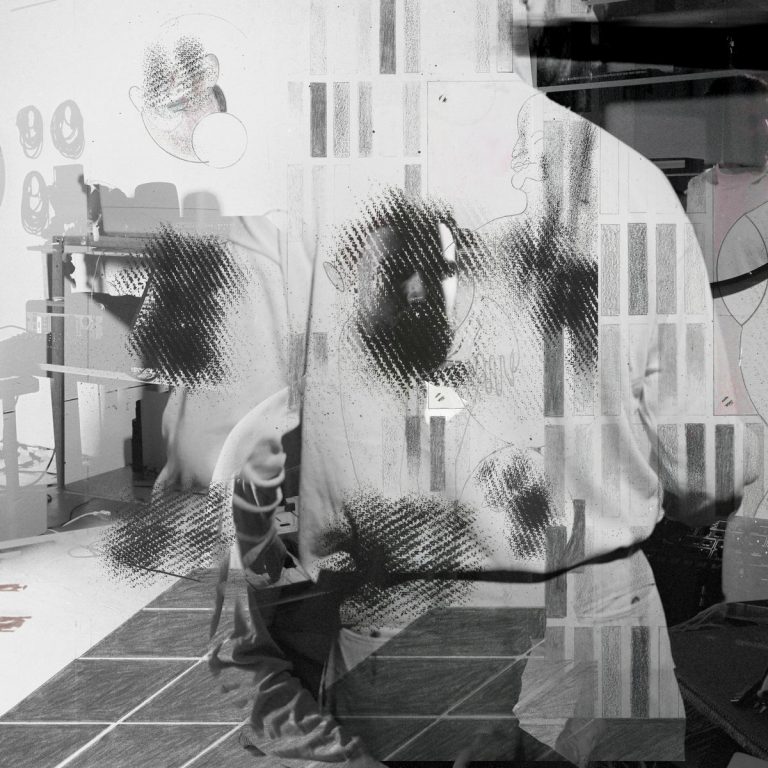If you’re a fan of art rock/post-punk band Crack Cloud, then you likely know Daniel Robertson’s name. Their 2020 album Pain Olympics featured tight rhythms, strange sounds, gritty guitars, peppy horns, mashed-up vocals, and basically a hundred other ingredients. It was sometimes brash, sometimes harsh, and sometimes sugary. One thing it wasn’t was calm or soft, and that’s exactly what this debut solo album from band member Daniel Robertson has in spades.
Nary an electric guitar or drum in sight, Robertson’s debut as Peace Chord on this self-titled album feels like it comes from a wholly different person. Where Pain Olympics opened with a steady beat, a wiry guitar, and a Wolf Parade-esque vocal delivery, Peace Chord opens with an utterly minimalistic piano phrase on first track “Seventy Times Seven”. Repeated with soft variations, the chord slowly meets Robetson’s hushed and feathery voice. The sung melody is just as simple as the piano, but the two meet in a sort of beautiful middle where mood fully takes over, and it all just hangs there like an aural still life. In the song’s final third, some bright synthesizers beam in, but only for about a minute, before leaving us where we started, at the piano.
“Seventy Times Seven” is the longest track here at just over five minutes, but it’s also a perfect encapsulation of what we’re in for over the remaining six tracks. The album is built upon little more than pretty, cyclical upright piano; woozy vintage synthesizers; and Robertson’s whispery vocal. His voice is stunning: light, as if ready to evaporate at any moment, skating through high notes and whispery falsettos with moving beauty. It’s a fragile instrument, but it lends itself well to the atmosphere and aesthetic that he’s going for here. At times, it recalls Michael Milosh’s delicate croon, specifically reminiscent of Rhye’s piano album, Spirit.
But while the sounds are truly lovely, there is a bit of a lack of variation. Little switches like some strummed acoustic guitar on “Empty in This House” aren’t really enough to shake up the program. “Juno” features a really lovely, wistful piano melody, but cuts out after two minutes of basically cycling through it. It’s hypnotic, yes, but not horribly deep. Robertson’s singing doesn’t pull out any new tricks after the first couple songs either, sounding a bit too familiar even by the 15-minute mark with “Omphalomancy”.
The most intriguing moments are the ones where Robertson blends in his synthesizers organically, embedding them into the body of the song. Tracks like the instrumental “Spectral Processor” give off a subtly eerie sense of foreboding with percolating, horn-like synths rippling through the speakers, and what sounds like Robertson’s disembodied voice being filtered through the background. It’s a brief but evocative moment. Likewise, the closing song “Crescent of Sun” gives his piano and voice a break, letting him bask in the melting beauty of his solitary, overlapping synth leads, almost like a painting of a sunrise.
But, even in its best moments, Peace Chord feels frustratingly thin, like an appetizer teasing a larger course. It will be very interesting to see how Robertson chooses to grow this project, as there are some beautiful passages and textures on this album. Despite the vocals and lyrics, it ends up feeling much more like an ambient piece, and if Robertson doubles down on that inclination and chooses to dive headlong into the kind of sonic world he only hints at here, Peace Chord could become something truly noteworthy, crafting something truly special. As it stands now, it’s a beautiful if far too ephemeral opening shot.

